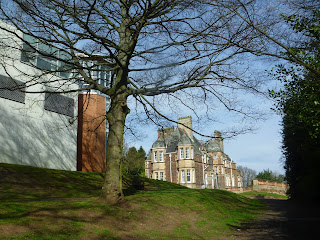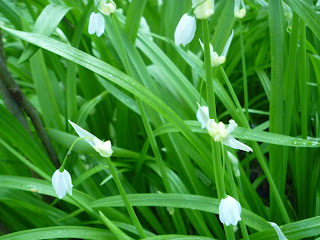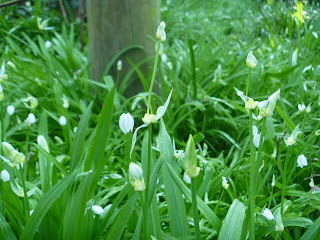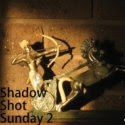The event celebrated the spirit of the Scottish Enlightenment by bringing together scientists, artists and other creative innovators to share ideas and inspiration on a diverse variety of topics ranging from nuclear waste disposal to the connections between dance and psychology. For me, it was inspiring to see so many people bringing different disciplines together - where art and science can find inspiration from each other, rather than viewing each other in mutual suspicion. Though as a poet and scientist I often think this mutual suspicion is overstated by people who are neither artists nor scientists.
Below are brief notes about the various speakers at the event, just to give a flavour of it!
DISCOVER
Polly Arnold started things off with nuclear waste disposal. A topic we're all probably aware of as being vitally important, but rarely has it been presented in such an engaging way. Polly used wonderful metaphors to describe things, for example comparing the large number of electrons in radioactive elements to pomegranate seeds. She gave some fascinating insights into how the elements of nuclear waste can be separated and transmutated to reduce the problems around disposal.
Following quickly on her heels, Peter Lovat talked about the connections between dance and psychology. Speaking from his own experience, Peter discussed how dance can help people with problem solving, improve memory and how it has been shown to reduce the symptoms of Parkinson's Disease. He also got everyone in the auditorium on their feet and dancing!

Tilo Kunath talked about regenerative medicine and how induced Pluripoten stem cells (which are made from adult cells rather than embryonic cells) are being researched as an ethical alternative to embryonic stem cells.
CREATE
After a short discussion and a coffee break we were back again with Suzy Glass of Trigger who talked about the importance of allowing yourself to fail along the path to creative or scientific progress. We need space to play and more grazed knees in the playground! She also talked a bit about her work with the residents of the island of Canna, a Scottish island that is facing a real population crisis (only ten people live on the island now). She has worked with a variety of creative people, including musicians who have created soundscapes of the island based on Gaelic songs about birds.
Tommy Perman and Simon Kirby of Found next presented a double act about their work in creating Cybraphon, an autonomous emotional robot that constantly searches itself on the internet then monitors its own emotions which then feed into a constant musical tune and Twitter and Facebook updates. It was fascinating to hear that Cybrophon receives virtual gifts from its Facebook followers after it reports that its mood is negative!
Sabrina Maniscalco then introduced us to the Quantum Circus a collaboration between quantum physicists and circus performers. We saw a clip of the Finnish performance of their musical circus show about Schrodingers cat, which was inspiring most artistically and scientifically, and will be appearing in Scotland in 2013 (duly translated into English!) definitely a show to see!
INNOVATE
To wake us up after lunch we were taken on a (virtual) run around Edinburgh landmark Arthur's Seat by Angus Farquhar of NVA. Their project Speed of Light aims to encourage local people to see the hill in a new light. Runners (many of them novices) wearing suits fitted with LED lights run around the hill in the dark in specially choreographed routes that weave light patterns in the open spaces.
Suitably refreshed we then found out from Gavin Starks about his incredibly ambitious project AMEE which aims to ultimately measure the carbon footprint of everything on earth, which works through tools such as household carbon calculators and embedding environmental sustainability in product design.
Another equally ambitious project is Zooniverse, which was presented by Chris Lintott. This is a huge citizen science project that aims to map the universe using volunteers to study astronomical photos to classify galaxies and to look for weird new features in the universe. It is a real example of how ordinary people can make a real difference to science and how scientists can facilitate the process by giving people the right tools to be able to effectively input data.
INSPIRE
The first speaker in the final session, Steve Blackmore of the Royal Botanic Garden Edinburgh talked about the absolute fundamental importance of plants to life on earth and how we should be taking better care of our green leafy companions.
Subathra Subramaniam then took us to the arctic with Cape Farewell, which brings artists, scientists and young people together to seek inspiration in the arctic and to share that inspiration with others through research, education and artistic works. One of their voyages was filmed as Burning Ice, which I reviewed during last year's Edinburgh International Film Festival here.
Finally Richard Wiseman, magician and psychologist appeared as a surprise guest to reveal the psychological secrets behind some common magic tricks.
*
I also blogged about the event here.It was lovely to meet Kate of blur of woodsmoke who was also there and blogged her impressions here!
I'll continue to blog about the Science Festival over the next two weeks both here and over on Clicket, where I was delighted to be chosen as one of their seven Science Festival bloggers!
Disclaimer - I received a press ticket for this event.As ever, text in red contains hyperlinks that take you to other websites where you can find out more!
































